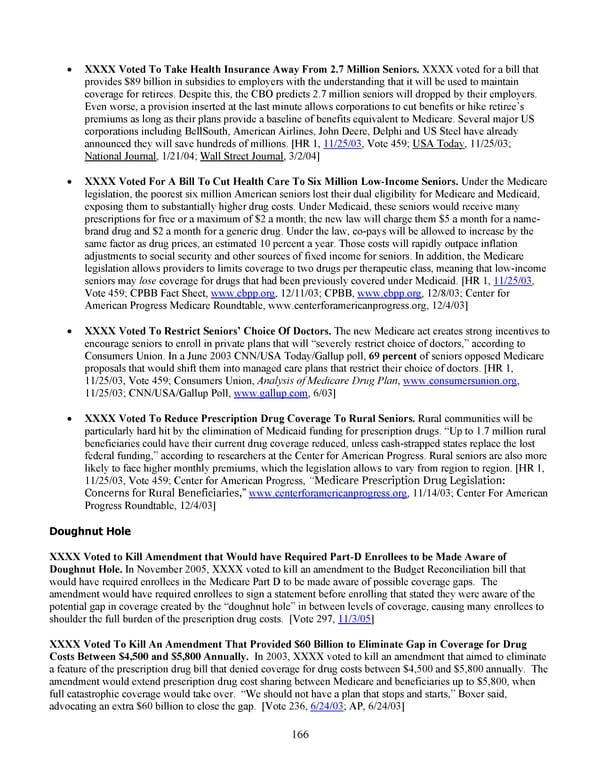XXXX Voted To Take Health Insurance Away From 2.7 Million Seniors. XXXX voted for a bill that provides $89 billion in subsidies to employers with the understanding that it will be used to maintain coverage for retirees. Despite this, the CBO predicts 2.7 million seniors will dropped by their employers. Even worse, a provision inserted at the last minute allows corporations to cut benefits or hike retiree’s premiums as long as their plans provide a baseline of benefits equivalent to Medicare. Several major US corporations including BellSouth, American Airlines, John Deere, Delphi and US Steel have already announced they will save hundreds of millions. [HR 1, 11/25/03, Vote 459; USA Today, 11/25/03; National Journal, 1/21/04; Wall Street Journal, 3/2/04] XXXX Voted For A Bill To Cut Health Care To Six Million Low-Income Seniors. Under the Medicare legislation, the poorest six million American seniors lost their dual eligibility for Medicare and Medicaid, exposing them to substantially higher drug costs. Under Medicaid, these seniors would receive many prescriptions for free or a maximum of $2 a month; the new law will charge them $5 a month for a name- brand drug and $2 a month for a generic drug. Under the law, co-pays will be allowed to increase by the same factor as drug prices, an estimated 10 percent a year. Those costs will rapidly outpace inflation adjustments to social security and other sources of fixed income for seniors. In addition, the Medicare legislation allows providers to limits coverage to two drugs per therapeutic class, meaning that low-income seniors may lose coverage for drugs that had been previously covered under Medicaid. [HR 1, 11/25/03, Vote 459; CPBB Fact Sheet, www.cbpp.org, 12/11/03; CPBB, www.cbpp.org, 12/8/03; Center for American Progress Medicare Roundtable, www.centerforamericanprogress.org, 12/4/03] XXXX Voted To Restrict Seniors’ Choice Of Doctors. The new Medicare act creates strong incentives to encourage seniors to enroll in private plans that will “severely restrict choice of doctors,” according to Consumers Union. In a June 2003 CNN/USA Today/Gallup poll, 69 percent of seniors opposed Medicare proposals that would shift them into managed care plans that restrict their choice of doctors. [HR 1, 11/25/03, Vote 459; Consumers Union, Analysis of Medicare Drug Plan, www.consumersunion.org, 11/25/03; CNN/USA/Gallup Poll, www.gallup.com, 6/03] XXXX Voted To Reduce Prescription Drug Coverage To Rural Seniors. Rural communities will be particularly hard hit by the elimination of Medicaid funding for prescription drugs. “Up to 1.7 million rural beneficiaries could have their current drug coverage reduced, unless cash-strapped states replace the lost federal funding,” according to researchers at the Center for American Progress. Rural seniors are also more likely to face higher monthly premiums, which the legislation allows to vary from region to region. [HR 1, 11/25/03, Vote 459; Center for American Progress, “Medicare Prescription Drug Legislation: Concerns for Rural Beneficiaries,” www.centerforamericanprogress.org, 11/14/03; Center For American Progress Roundtable, 12/4/03] Doughnut Hole XXXX Voted to Kill Amendment that Would have Required Part-D Enrollees to be Made Aware of Doughnut Hole. In November 2005, XXXX voted to kill an amendment to the Budget Reconciliation bill that would have required enrollees in the Medicare Part D to be made aware of possible coverage gaps. The amendment would have required enrollees to sign a statement before enrolling that stated they were aware of the potential gap in coverage created by the “doughnut hole” in between levels of coverage, causing many enrollees to shoulder the full burden of the prescription drug costs. [Vote 297, 11/3/05] XXXX Voted To Kill An Amendment That Provided $60 Billion to Eliminate Gap in Coverage for Drug Costs Between $4,500 and $5,800 Annually. In 2003, XXXX voted to kill an amendment that aimed to eliminate a feature of the prescription drug bill that denied coverage for drug costs between $4,500 and $5,800 annually. The amendment would extend prescription drug cost sharing between Medicare and beneficiaries up to $5,800, when full catastrophic coverage would take over. “We should not have a plan that stops and starts,” Boxer said, advocating an extra $60 billion to close the gap. [Vote 236, 6/24/03; AP, 6/24/03] 166
 HRC vote skeleton Page 179 Page 181
HRC vote skeleton Page 179 Page 181